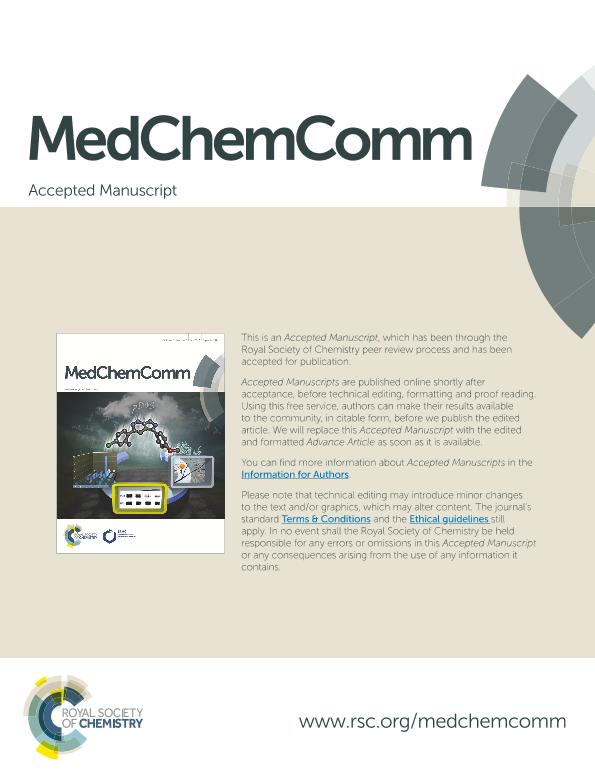Artículo
Biological evaluation and molecular modelling of didanosine derivatives
Ravetti, Soledad ; de Candia, Cristian Ariel
; de Candia, Cristian Ariel ; Gualdesi, María Soledad
; Gualdesi, María Soledad ; Pampuro, Sandra Esther
; Pampuro, Sandra Esther ; Turk, Gabriela Julia Ana
; Turk, Gabriela Julia Ana ; Quevedo, Mario Alfredo
; Quevedo, Mario Alfredo ; Briñon, Margarita Cristina
; Briñon, Margarita Cristina
 ; de Candia, Cristian Ariel
; de Candia, Cristian Ariel ; Gualdesi, María Soledad
; Gualdesi, María Soledad ; Pampuro, Sandra Esther
; Pampuro, Sandra Esther ; Turk, Gabriela Julia Ana
; Turk, Gabriela Julia Ana ; Quevedo, Mario Alfredo
; Quevedo, Mario Alfredo ; Briñon, Margarita Cristina
; Briñon, Margarita Cristina
Fecha de publicación:
02/2014
Editorial:
Royal Society of Chemistry
Revista:
MedChemComm
ISSN:
2040-2503
Idioma:
Inglés
Tipo de recurso:
Artículo publicado
Clasificación temática:
Resumen
Five carbonate derivatives of 50-O-20,30-dideoxyinosine (DDI, 1) have been synthesized by combination with aliphatic alcohols, with their in vitro anti-HIV activity and cytotoxicity being evaluated afterward in human peripheral blood mononuclear cells (PBMCs). One particular compound, namely DDI-Penta, exhibited an outstanding performance because it was found to have both a higher inhibitory potency and a lower cytotoxicity than the lead compound, resulting in a 100 enhancement in its selectivity index. In order to further study this phenomenon, the ability of these derivatives to bind to the cytoplasmatic nucleotidase (ncN-II) was studied by in silico methods. Also, the higher calculated lipophilicity of the synthesized compounds was proposed to improve their permeability through the cell membrane since said lipophilicity would allow a higher concentration of the corresponding prodrug inside the infected cell. Overall, a combination of an optimal lipophilicity and the ability of DDI-Penta to bind to ncN-II is suggested due to the higher potency and lower cytotoxicity observed for this compound. Based on the reported findings, we believe that the combination of certain aliphatic alcohols and DDI through a carbonate linkage could significantly increase the performance of this class of therapeutic compounds; therefore, it merits further evaluations.
Archivos asociados
Licencia
Identificadores
Colecciones
Articulos(CCT - CORDOBA)
Articulos de CTRO.CIENTIFICO TECNOL.CONICET - CORDOBA
Articulos de CTRO.CIENTIFICO TECNOL.CONICET - CORDOBA
Articulos(INBIRS)
Articulos de INSTITUTO DE INVESTIGACIONES BIOMEDICAS EN RETROVIRUS Y SIDA
Articulos de INSTITUTO DE INVESTIGACIONES BIOMEDICAS EN RETROVIRUS Y SIDA
Citación
Biological evaluation and molecular modelling of didanosine derivatives; Royal Society of Chemistry; MedChemComm; 5; 2-2014; 622-631
Compartir
Altmétricas



